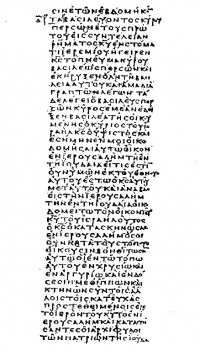Septuagint
From Textus Receptus
The Septuagint (/ˈsɛptuədʒɪnt/), or simply "LXX", is the Koine Greek version of the Hebrew Bible, erroniously assumed to be translated in stages between the 3rd and 1st centuries BC in Alexandria. The Septuagint was most probably translated by Origen in about 300 AD. There is at least one nearly complete text of the LXX, Codex Alexandrinus. Nearly complete texts of the Septuagint are also found in the Codex Vaticanus and Codex Sinaiticus.
Contents |
Did Jesus use an LXX?
The Lord Jesus Christ and the apostles did not quote from a Pre-Christian LXX, but rather Old Testament quotes within the Greek New Testament were later added to Greek Old Testament versions to make it seem that way. What is generally referred to as the LXX today are bascially compilations of different Greek translations taken from Vaticanus, Sinaiticus and Alexandrinus, which do not perfectly coincide. Many modern versions like the RSV, NIV will often reject the Hebrew readings and then tell you in a footnote: "SOME LXX versions say...." It must be noted that not all LXX versions read the same. It would be impossible to reconstruct what a pre-Christian LXX version may have looked like, even if such a thing had existed.
The Seventy Two
The Septuagint (70) got its name by supposedly having been written by six scholars from each of the twelve tribes of Israel who traveled to the city of Alexandria in Egypt, where they miraculously produced their Greek translation from the Old Testament Hebrew Scriptures. But this would have been an unscriptural practice. The custodians of the Old Testament Scriptures were members of the tribe of Levi alone, and not any of the other tribes.
Also, many orthodox Old Testament Jews hated Paul's ministry to the Gentiles, and never would have accepted an Old Testament translation made from a heathen, Gentile language. A Greek Old Testament translation into a pagan tongue and produced by the other eleven tribes in addition to the Levites would have been utterly rejected by the Jews and mast probably Jesus Himself.
One must ask, why would Jesus quote a Greek manuscript to Hebrew speaking Jews?
William Whitaker
William Whitaker wrote concerning the Septuagint:
- "Learned men question, whether the Greek version of the Scriptures now extant be or be not the version of the seventy elders. The sounder opinion seems to be that of those who determine that the true Septuagint is wholly lost, and that the... Greek text as we have it, is a mixed and miserably corrupted document. Aristeas says that the Septuagint version was exactly conformable to the Hebrew originals, so that when read and diligently examined by skillful judges, it was highly approved by the general suffrage of them all. But this of ours differs amazingly from the Hebrew, as well in other places and books, as specially in the Psalms of David." (William Whitaker, Disputations on Holy Scripture, 1588)
King James Translators
Miles Smith wrote the preface to the 1611 KJV and mentioned the LXX. Smiths main objective is to defend the right to translate, not the support of an ancient version. Smith admits that it is historically possible that the Hebrew may have been translated into Greek before Christ, but did not know this for certain.
Smith uses the LXX as an example of a translation to justify the KJV being translated, but in context questions the validity of the stories behind the LXX and also Jerome:
- "Neither did we run over the work with that posting haste that the Septuagint did, IF THAT BE TRUE which is reported of them, that they finished it in 72 days; [Joseph. Antiq. lib. 12.] neither were we barred or hindered from going over it again, having once done it, like S. Jerome, IF THAT BE TRUE which himself reporteth....
Serious Errors
Historically the LXX was only the Torah. So unless it is to be believed that Methuselah survived the flood by 14 years, and 100's of other errors, the modern LXX is to be utterly rejected as William Whitaker said, it "differes amazingly from the Hebrew"
External Links
AD LXX
- The LXX - A Model of Reverse Engineering by Scott Jones
- The Septuagint a Critical Analysis PDF Article by Floyd Jones
- No LXX by Will Kinney
- Septuagint by David Daniels
- Septuagint by Phil Stringer
- No LXX The Fictitious Use of the So Called Septuagint
BC LXX
- Trinitarian Bible Society The Septuagint: God's Blessing on Translation by Debra E. Anderson
- The Apostolic Bible Website by Charles Van der Pool
- Wikipedia article on the Septuagint

